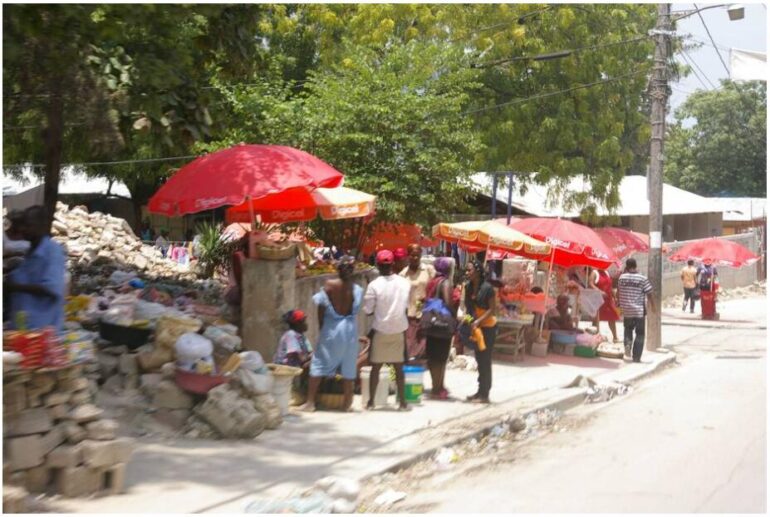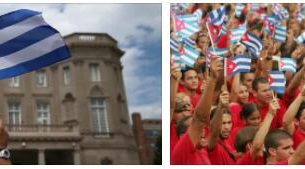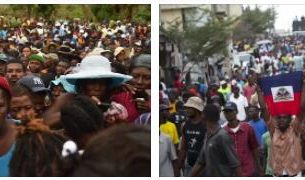Currency: Gourde (HTG)
Exchange rate: 78.90 per € (03.12.2020)
Time zone: Eastern Standard Time (EST)
Country code (phone): 00 (509)
Climate (for capital): subtropical – tropical
Money and finance
When traveling to Haiti, one should not rely solely on electronic means of payment. Although it is possible to withdraw money with the EC card at some points, the function of the machines is not always guaranteed. Numerous larger shops, hotels and restaurants officially accept different credit cards, but you should also explicitly ask whether payment by card is possible. The cheapest way to change money is in large supermarkets, which usually have an exchange office. The waiting times in banks are extremely long and the exchange rates are less favorable. The Haitian currency is the gourde, the exchange rate is around 55 Gourde / US $ 1. It is also possible to exchange euros; for one euro you get around 73 gourde. In some shops and in the markets, prices are given in dollars. You have to note, however, that it is not necessarily the US currency, but possibly the so-called Haitian dollar, a fictitious currency where 1 dollar equals 5 gourde. This information comes from the time when the Gourde exchange rate was pegged to the dollar. The current exchange rate can be found at OANDA, for example.
Everyday life and security
The Federal Foreign Office points out that travel to Haiti still requires special security precautions. The crime is high especially in the capital Port-au-Prince and the security situation tense because of frequent demonstrations. In the capital, travelers should avoid the urban areas Cité Soleil, Martissant, Carrefour, Bel Air, Cíté Militaire and Jean-Marie Vincent if possible. It is therefore advisable for newcomers without local knowledge to arrive at the airport to be picked up. In general, you should move around at least initially accompanied by someone familiar with the area, as the cityscape of Port-au-Prince is still shaped by the earthquake and maps often do not help with orientation. In the rural regions the security situation is much more relaxed. While simple thefts and pickpockets are reported less frequently in Haiti than in other countries in the region, armed robberies against motorists and other road users are on the increase. Firearms are often used. The attacks are often carried out by organized gangs. So far, their activities have concentrated on some urban areas of Port-au-Prince (Cité Soleil, Martissant, Carrefour), but in the meantime these gangs have expanded their radius of action to more affluent urban areas such as Pétionville and also to rural regions. The risk of an attack in traffic jams and on the way from the airport or from a bank is particularly high. In the past few months, there has been an increasing number of criminals chasing victims home to strike. You should therefore remain particularly vigilant in these situations and, in traffic jams, expect perpetrators to possibly approach the vehicle on foot or on a motorcycle.
Health
According to businesscarriers, the health care in Haiti is generally, but restricted mainly in the countryside. When traveling to Haiti you should note that there is an increased risk of malaria infection, especially in the period from May to November. It is therefore advisable to take appropriate prophylaxis or to carry medication and a mosquito net. Due to the still existing risk of cholera infection, one should be very careful to adhere to hygienic measures. AIDS is another health problem in Haiti. In general, one should note that Haitian pharmacies are not always well stocked and that medicines and an emergency pharmacy that are needed regularly must be carried with you to be on the safe side. General information on vaccination protection can be obtained from resident doctors or the Tropical institutes. Chikungunya fever has been widespread in Haiti since 2014 and is transmitted by mosquitoes and causes fever, joint pain and nausea. Although the number of cases of the disease has decreased since October 2014, the risk of infection remains. Since there is no effective prophylaxis against this viral disease, adequate protection against insects is of the utmost importance. Since the end of 2015, Haiti, like other Latin American countries, is at risk of contracting the Zika virusto infect. The virus is transmitted by the Aedes mosquito bite, as well as through sexual intercourse. The infection often goes unnoticed, but it can also lead to symptoms resembling a cold or rashes. The virus can be dangerous to pregnant women as it can cause microcephaly in newborn children. Haiti is currently also affected by Covid-19. Since care is not guaranteed in a hospital, special care must be taken to avoid infection.
Family
If you travel to Haiti with children and want to stay there for a longer period of time, you shouldn’t forget that the country is still affected by the severe earthquake in January 2010. So you should inquire well in advance how school attendance is to be organized, because not all schools have been able to resume operations without restrictions. Another point that requires attention is the general security situation, which significantly restricts freedom of movement, especially that of children. The leisure activities, which mainly focus on Petionville, are also limited.




